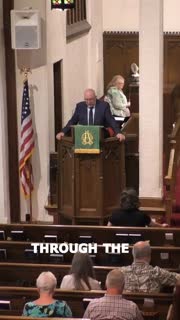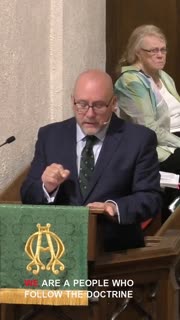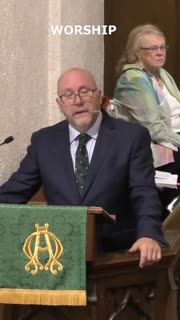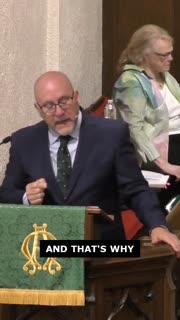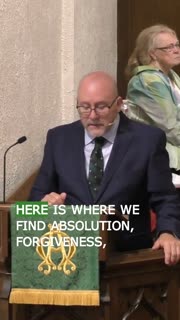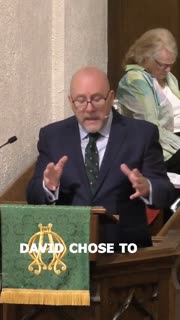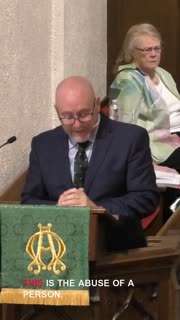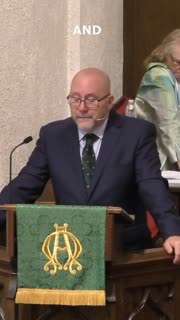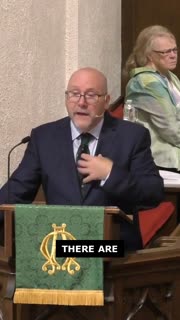Power, Sin, and Redemption: Lessons from David's Fall
Devotional
Sermon Summary
Bible Study Guide
Sermon Clips
### Quotes for Outreach
1. "Through the power of the Holy Spirit within us, God is able to accomplish abundantly far more than all we can ask or imagine. So hear and believe the good news that in Jesus Christ, we are forgiven." [08:14] (19 seconds)
2. "We are a people who follow the doctrine of grace. That through God's grace and grace alone we are forgiven. In other words, we follow Jesus Christ who died for our sins, redeemed us by our faith, and rose again that we might have eternal life with God." [14:51] (22 seconds)
3. "Worship is supposed to be a happy experience. I'm supposed to feel better about myself when I come out of worship, not worse. And by the way, I agree with that statement. We are to feel better going out than when we came in." [19:10] (22 seconds)
4. "And that's why we need confession in our lives. In our weekly worship. To give that up to God. seek God's forgiveness, God's blessing, God's grace. And even when the words of that corporate prayer of confession, the prayer that I pray, don't quite match up to our own experiences, there is space to offer our own prayers." [20:31] (28 seconds)
5. "Here is where we find absolution, forgiveness, redemption, and blessing that allows us to start over and to seek out who we want to be, to be renewed and refreshed spiritually, to be the one who God calls us to be, to have strength and resolve to meet the next day." [22:17] (29 seconds)
### Quotes for Members
1. "David, on the other hand, has been exemplary. He has risen from a lowly shepherd, to giant slayer, to warrior poet, to conqueror of enemy nations, leading his armies into battle. Going forth with the Lord's blessing against all enemies. He is led by example. He has shown grace and mercy. He has been generous and sought peace, often rather than war. He has faith and trust in the Lord. He is a man after God's own heart." [09:05] (37 seconds)
2. "David chose to remain at home when kings are supposed to go to war. David sends Joab and his armies out to battle for him. David chooses to stay at Jerusalem. David goes to the roof of his palace and looks down upon the other roofs, the rooftops, and David sees Bathsheba and sends someone to ask about her. David has someone bring her to him. David lays with her and she gets pregnant. Over and over, David is in full control of his actions." [12:14] (41 seconds)
3. "This is the abuse of a person, Bathsheba, and of power, his kingship. When a person of authority with great power and few checks or balances makes decisions based on his or her own needs and desires and has the influence, the sway, the capability to make those decisions happen immorality sets to work destroying their character and filling them with destructive pride." [13:33] (35 seconds)
4. "And yet both Uriah and Bathsheba have shown nothing but loyalty beyond question to King David. They have responded to him without question or hesitation. What an opportunity to make things right. What an opportunity to redeem himself. And instead the king continues his sinfulness. He doesn't just continue it, he expands it and compounds it and makes it hopelessly worse." [16:01] (34 seconds)
5. "There are things that have been done, things that have been left undone, that weigh upon us. here is where we can offer all of that up to the God who loves us. Here is where we find absolution, forgiveness, redemption, and blessing that allows us to start over and to seek out who we want to be, to be renewed and refreshed spiritually, to be the one who God calls us to be, to have strength and resolve to meet the next day." [22:17] (47 seconds)
Ask a question about this sermon
1. "Through the power of the Holy Spirit within us, God is able to accomplish abundantly far more than all we can ask or imagine. So hear and believe the good news that in Jesus Christ, we are forgiven." [08:14] (19 seconds)
2. "We are a people who follow the doctrine of grace. That through God's grace and grace alone we are forgiven. In other words, we follow Jesus Christ who died for our sins, redeemed us by our faith, and rose again that we might have eternal life with God." [14:51] (22 seconds)
3. "Worship is supposed to be a happy experience. I'm supposed to feel better about myself when I come out of worship, not worse. And by the way, I agree with that statement. We are to feel better going out than when we came in." [19:10] (22 seconds)
4. "And that's why we need confession in our lives. In our weekly worship. To give that up to God. seek God's forgiveness, God's blessing, God's grace. And even when the words of that corporate prayer of confession, the prayer that I pray, don't quite match up to our own experiences, there is space to offer our own prayers." [20:31] (28 seconds)
5. "Here is where we find absolution, forgiveness, redemption, and blessing that allows us to start over and to seek out who we want to be, to be renewed and refreshed spiritually, to be the one who God calls us to be, to have strength and resolve to meet the next day." [22:17] (29 seconds)
### Quotes for Members
1. "David, on the other hand, has been exemplary. He has risen from a lowly shepherd, to giant slayer, to warrior poet, to conqueror of enemy nations, leading his armies into battle. Going forth with the Lord's blessing against all enemies. He is led by example. He has shown grace and mercy. He has been generous and sought peace, often rather than war. He has faith and trust in the Lord. He is a man after God's own heart." [09:05] (37 seconds)
2. "David chose to remain at home when kings are supposed to go to war. David sends Joab and his armies out to battle for him. David chooses to stay at Jerusalem. David goes to the roof of his palace and looks down upon the other roofs, the rooftops, and David sees Bathsheba and sends someone to ask about her. David has someone bring her to him. David lays with her and she gets pregnant. Over and over, David is in full control of his actions." [12:14] (41 seconds)
3. "This is the abuse of a person, Bathsheba, and of power, his kingship. When a person of authority with great power and few checks or balances makes decisions based on his or her own needs and desires and has the influence, the sway, the capability to make those decisions happen immorality sets to work destroying their character and filling them with destructive pride." [13:33] (35 seconds)
4. "And yet both Uriah and Bathsheba have shown nothing but loyalty beyond question to King David. They have responded to him without question or hesitation. What an opportunity to make things right. What an opportunity to redeem himself. And instead the king continues his sinfulness. He doesn't just continue it, he expands it and compounds it and makes it hopelessly worse." [16:01] (34 seconds)
5. "There are things that have been done, things that have been left undone, that weigh upon us. here is where we can offer all of that up to the God who loves us. Here is where we find absolution, forgiveness, redemption, and blessing that allows us to start over and to seek out who we want to be, to be renewed and refreshed spiritually, to be the one who God calls us to be, to have strength and resolve to meet the next day." [22:17] (47 seconds)
